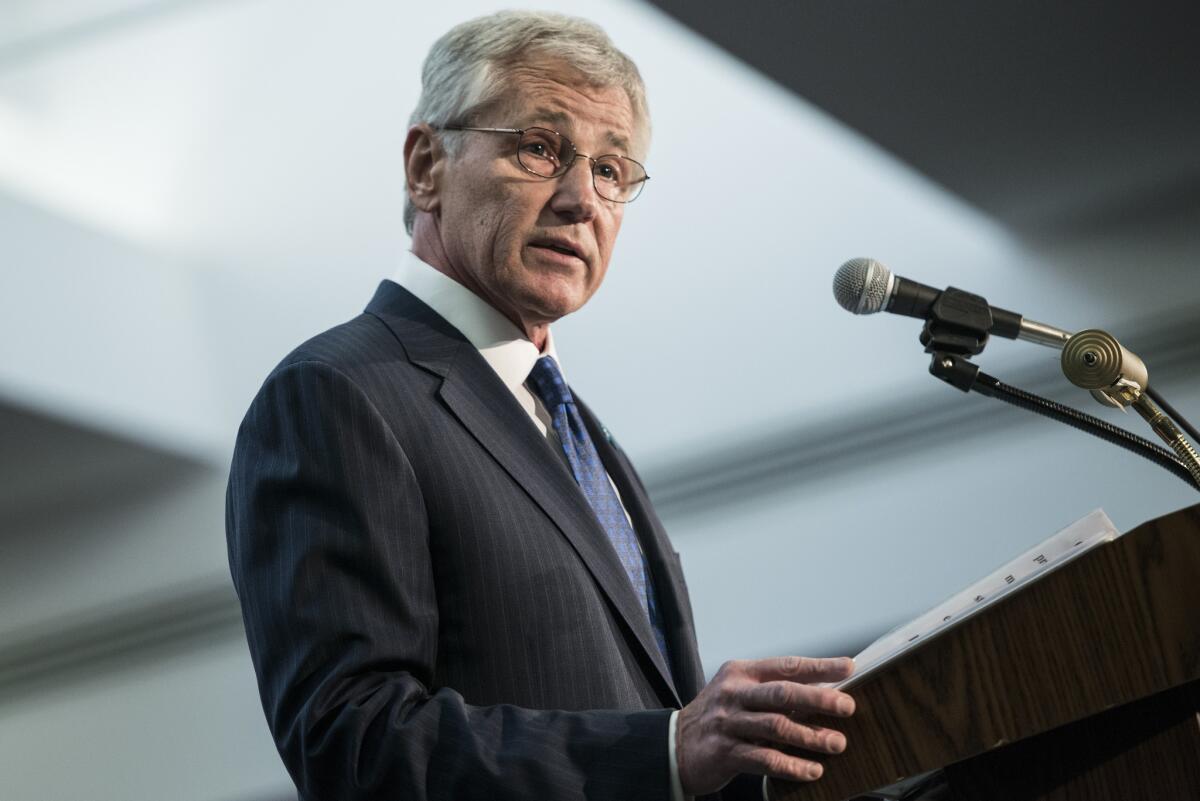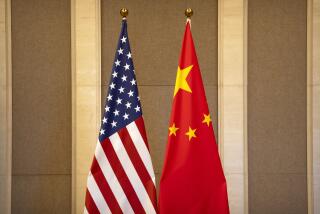Opinion: Hagel: Talk about ‘zero option’ in Afghanistan is a negative for U.S.

Defense Secretary Chuck Hagel said he wishes that unnamed White House aides would stop suggesting that it would be OK for the United States to withdraw all its troops from Afghanistan.
He said he worries about a resurgence of old-fashioned nationalism around the world -- including in Asia, where China and Japan have faced off over a string of uninhabited islands in the East China Sea -- but that he thinks China and the United States can continue working out their differences peacefully, and that Japan’s moves toward more assertive defense policies are a good thing.
Those are among the take-aways from my conversation with Hagel last week -- an interview that was summarized in my column published Sunday. That column focused on Hagel’s promise that the U.S. pivot to Asia -- the “rebalance” of foreign policy, to use the official term -- is still a major focus for the Obama administration, despite the press of crises in Ukraine and the Middle East.
Here are edited excerpts from the rest of the conversation:
Question: You’re going to be meeting with defense ministers from the Assn. of Southeast Asian Nations, the smaller countries that live next door to China. When they ask what the U.S. pivot to Asia means for their security, what do you tell them?
Answer: The rebalance ... is not about -- never has been about -- a military buildup or strategy focused on containing China. That’s not the objective.
We would never ask a nation [to] choose between China and the United States. We get the reality of where they live. That’s not the objective. The objective is to ... recognize that China, for us, is a relationship that’s both cooperative and competitive.
We welcome an integrated China into an integrated world of responsible institutions. Like all nations, we want [them] to follow the laws, the international norms; but we want them to prosper. It’s in everybody’s interests. ...
I have been asked by ASEAN defense ministers: What do you bring me? Well, I bring you the assurance of our commitment to your region ... to do everything possible -- for our own interests -- to keep those sea lanes open, and to keep those skies free, and cyberspace free. And that is in the interests of stability and prosperity and security for all the region. We’re not going anywhere. I think that’s pretty clear.
Q: How concerned are you about the standoff between China and Japan over the Senkaku islands?
A: Well, I have a concern about the Senkakus, or any of those disputed islands, because ... there is always the danger of some kind of a spark setting off a conflict, of an unintentional consequence to some occurrence.
Q: Japan is moving toward a more assertive defense policy, including possible reinterpretation of its constitutional limits on military action abroad. Is that a good thing?
A: Sovereign nations will make their own decisions based on their own self-interest. We honor that.
Japan is a thriving democracy. ... They are an ally, a treaty ally. And so as they start to look out beyond where they’ve been, on what they see as their responsibilities, I think that’s smart. ... I think that’s a good thing.
Q: Do you worry about nationalist impulses increasing in Japan, [South] Korea and China? Is the American secretary of Defense the one who has to go out and tell them, ‘Be careful’?
A: I do do that. And I think history has taught very clearly that nationalist tendencies that become uncontrollable, ... are very dangerous and usually lead to big problems; in many cases they’ve led to war. I think that’s always an issue that countries have to be careful with.
Q: On Afghanistan, you’ve endorsed the proposal of the U.S. commander, Gen. Joseph Dunford, who has asked for 10,000 American troops to remain after 2014, right?
A: That has been, kind of, the number that Gen. Dunford and others have suggested when the president asked for a range of options as to what you could accomplish. Now, there are other ways you can accomplish some of the mission. So nobody’s stuck on 10,000.
We want to make sure that the force matches ... whatever the mission is that the president wants. Now, the president has said [the mission is to] train, assist, advise on counter-terrorism. The president has been very clear on that. NATO has been very clear on that. We’re still planning for that.
Q: Is it helpful when people [in Washington] talk about a ‘zero option,’ a complete withdrawal, as a reasonable option for the United States?
A: I don’t think it’s helpful, because it’s not what the president has said he thinks we can continue to do. ... It’s not a particularly helpful scenario to play that out, because I think that unnecessarily projects into the Afghan situation -- primarily the people, [the] Afghan army and those on the other side, the Taliban and others who want to undo everything -- the wrong message.
Q: In February, you proposed a defense budget a little over $500 billion for the coming fiscal year, but that was before Russia invaded Crimea. Should Congress now consider giving you more than that?
A: The numbers that we requested are what we think are necessary to fulfill the objectives and the missions of our strategic interests around the world. And we believe we can carry out those missions and achieve those objectives with those numbers. If you go lower from what we have presented, then we’re going to take more risks.
Q: Is the world a little riskier and more challenging now than it was two months ago when you were putting that budget together?
A: Well, I think it is, in light of what the Russians have done, yes.
ALSO:
Beware the rise of Putin the Terrible
Chuck Hagel: The Asia Pivot is still on
When rulers go bad: A peek inside 5 doomed dictators’ opulent lifestyles
Follow Doyle McManus on Twitter @doylemcmanus and Google+
More to Read
A cure for the common opinion
Get thought-provoking perspectives with our weekly newsletter.
You may occasionally receive promotional content from the Los Angeles Times.






